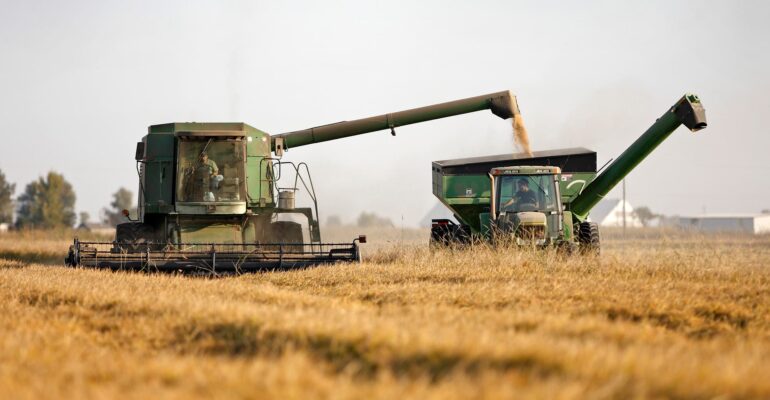Study Agriculture in USA | Top Universities & Career Guide 2026
Studying agriculture in the USA is a smart choice for many students. The country is known for its strong farming industry and advanced technology. American universities offer courses that teach both traditional farming and modern agricultural science.
You can learn about different subjects like crop growing, animal care, food processing, and farm business. Classes combine both theory and hands-on experience, giving students practical skills for the real world.
With many areas to specialize in, you can choose a path that fits your interests. Graduates find jobs in farming companies, research centers, food industries, and the government. Studying agriculture in the USA opens the door to a bright future in a growing and important field.
Types of Agriculture Degrees in the USA
In the USA, agriculture degrees offer a rich and diverse education that combines science, technology, business, and environmental studies. These programs prepare students to meet the demands of modern agriculture while also focusing on sustainability and innovation.
Bachelor of Science in Agricultural Science
This degree provides a strong foundation in core agricultural subjects like plant biology, soil management, pest control, and crop production. It also covers animal science, agricultural economics, and farm business management. Many programs include hands-on learning through labs, fieldwork, and internships. Students gain experience with modern farming technologies such as precision agriculture, biotechnology, and sustainable practices. Graduates can pursue careers in farm management, agricultural research, agribusiness, and environmental consultancy.
Bachelor of Science in Agribusiness
This degree blends agriculture with business skills, focusing on the economics and management side of farming and food production. Students learn about supply chain logistics, marketing of agricultural products, farm financial management, and rural development. This degree equips students to handle challenges related to food distribution, trade policies, and agricultural markets, preparing them for roles in agribusiness management, consulting, and policy making.
Specialized Degrees and Certificates
Many universities offer specialized programs such as Agricultural Engineering, Environmental Agriculture, Animal Science, Horticulture, and Agricultural Education. These programs often emphasize sustainability, technological innovation, and scientific research. Certificates and associate degrees are also available for students seeking shorter, focused training in particular areas like farm management or agricultural technology.
Course Duration and Costs
A typical bachelor’s degree in agriculture takes about 4 years to complete. The yearly tuition fees range from $10,000 to $40,000 or more, depending on the university. Entry requirements usually include a high school diploma with good grades in science subjects such as biology and chemistry.
Master of Science in Agriculture: Advancing Skills for Future Leaders
A Master of Science in Agriculture in the USA delivers an advanced and practical education tailored for emerging leaders in the agricultural sector. These programs blend core subjects—such as plant and soil science, animal science, agronomy, and agricultural economics—with modern fields like agroecology, biotechnology, and sustainable farming systems. Students explore real-world topics including food production, resource management, rural development, and agricultural policy through a mix of coursework, independent research, and industry internships.
Most degrees encourage students to specialize in areas like agribusiness, crop genetics, animal nutrition, or agricultural data analysis, with opportunities to work on pioneering research projects. Leadership, ethics, and communication skills are also emphasized, preparing graduates to solve food security challenges and promote sustainable practices in communities worldwide.
Typical master’s programs last two years and can include both thesis and non-thesis options. Entry requires a relevant bachelor’s degree, plus supporting documents such as standardized test scores (often GRE), recommendations, and a statement of purpose. Annual fees typically range from $15,000 to $40,000, depending on the university and specialization.
Career Pathways in Agriculture
The agriculture industry in the USA is thriving and filled with opportunities for skilled graduates. Careers range from hands-on roles in crop production to advanced positions in technology and sustainability. Agronomists guide farmers on crop management, improving yields and sustainable practices. Agricultural engineers innovate and design equipment, from automated machinery to smart irrigation systems. Animal scientists develop nutrition plans and safety standards for livestock health and productivity.
Agribusiness professionals oversee logistics, marketing, and finances for food companies and farms, while agricultural consultants offer tailored advice on sustainability and technology. Environmental consultants and engineers support eco-friendly practices and solve environmental challenges. Government agencies employ inspectors, economists, and policy advisors who help regulate and develop the sector. Food scientists and technologists work in labs to create safe, high-quality products. Educators and extension officers play a vital part in training future professionals and sharing new agricultural knowledge.
Agricultural Salary Overview
Salaries in US agriculture vary based on roles, qualifications, and experience. Agronomists and agricultural consultants commonly earn between $60,000 and $120,000 annually. Agricultural engineers typically see salaries from $75,000 to $120,000 or more, with advanced roles commanding higher pay. Farm managers can make between $70,000 to $120,000 depending on the type and scale of their operation. Entry-level positions in agribusiness, equipment technology, and crop management often start at $50,000–$70,000, with experienced professionals exceeding $100,000. Animal scientists and food technologists also have strong earning potential, reflecting the sector’s ongoing demand and innovation.
The earning potential and career progression in agriculture are shaped by specialization, geographic location, and the drive for sustainability—making it a dynamic choice for those interested in science, business, and management.
Leading Universities for Agriculture Studies in the USA
Students interested in agriculture have a wealth of top-ranked universities to choose from in the USA. These schools are known for their innovative programs, expert faculty, and hands-on research opportunities. Agriculture majors here often receive access to advanced laboratories, large research farms, and close industry ties, making these universities ideal choices for anyone aiming for a career in agricultural sciences.
Here are some of the highest-rated American universities for agriculture studies:
- Cornell University
- University of California, Davis
- University of Florida
- University of Illinois Urbana-Champaign
- Purdue University
- Iowa State University
- University of Massachusetts Amherst
- Michigan State University
- University of Wisconsin-Madison
- Harvard University
Final Thoughts
Studying agriculture in the USA opens a world of possibilities for driven students and future leaders. Top-ranked universities deliver hands-on education and research that prepare graduates for high-growth roles across technology, sustainability, business, and science. With a vast selection of degrees and specializations, students can shape a path that matches their interests—whether in crop production, agribusiness, or environmental solutions.
A career in agriculture offers competitive salaries, job security, and the chance to make a meaningful impact on food security and sustainability worldwide. As the sector continues to evolve with new technologies and global challenges, agriculture graduates are uniquely positioned to drive innovation and shape the future. Whether entering industry, research, or government, the skills and experience gained in American agriculture programs set the foundation for lifelong success and growth. If interested in pursuing agriculture studies or any other field in the USA, M.R. Consultants is here to help.






